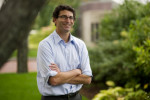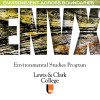2013 Speakers

Nikita Zimov
Speaker at the Opening Event at the Oregon Zoo
“Past and Future of the Mammoth Steppe Ecosystem”
Hosted by the Pamplin Society, scientist Nikita Zimov is the Director of Pleistocene Park, a project that is importing megafauna like horses, bison, tigers - and perhaps even clones of Wooly Mammoth - into Siberia to cause massive landscape-scale ecological change. As the animals adapt, a newly engineered ecosystem will develop that mimics the function of siberian grasslands at the end of the ice age. Once one of the world’s dominant biomes, these grasslands will simultaneously serve as a large scale experiment, help solve unanswered questions about the roles of humans in early mass extinctions, and could, by acting as a carbon sink, become a major part of the fight against global climate change.

Jack Horner
Montana State University
Professor of Paleontology
“Bioengineering New Animals for our Future World”
Jack Horner curates the Museum of the Rockies in Bozeman, Montana, and has a long career working in paleontology, including over 100 published papers, six books and the discovery of the Maiasaura dinosaur. He has been the technical advisor for all the Jurassic Park films, and in 2009, published the book How to Build a Dinosaur: Extinction Doesn’t Have to Be Forever, describing how one might recreate a dinosaur.

Ronald Sandler
Northeastern University
Director, Ethics Institute
“The Ethical Significance of Naturalness and Artifactualness”
Ronald Sandler is an associate professor of philosophy in the Department of Philosophy and Religion, a researcher in the Nanotechnology and Society Research Group, and a research associate in the Environmental Justice Research Collaborative at Northeastern University. His primary areas of research are environmental ethics, ethics and technology, ethical theory, and Spinoza.
The mission of the Dr. Robert B. Pamplin, Jr. Society of Fellows is to establish a model collegiate environment which fosters among undergraduate students the discipline alike of mind, body, and character by nurturing intellect, encouraging academic achievement, valuing integrity of character, and furthering the commitment and ability to work together and to lead. The Society is intended to be a resource to create new generations of leaders, who throughout their lives and careers, will identify new directions, devise the means to pursue them, and succeed in a way that inspires others to perform to their own highest potential.
Environmental Studies is located in room 343A of John R. Howard Hall on the Undergraduate Campus.
MSC: 62
email envs@lclark.edu
voice 503-768-7790
fax 503-768-7620
Symposium Advisor Jessica Kleiss
Environmental Studies
Lewis & Clark
615 S. Palatine Hill Road MSC 62
Portland OR 97219
